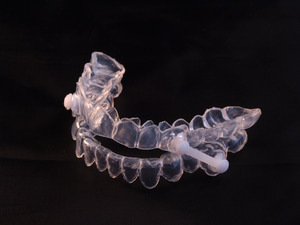
Many patients with sleep apnea are unhappy with their CPAP machines and thus often end up pursuing oral appliance therapy as an alternative. Personalized oral appliances are quite reliable when it comes to reducing sleep apnea symptoms, but it should be noted that there are different types of appliances to choose from. Dentists who want to provide oral appliance therapy as a sleep apnea solution should take the time to familiarize themselves with the available treatment options.
Types of Sleep Apnea Oral Appliances
If a patient is eligible for oral appliance therapy, one of the following options may be considered:
- Mandibular Advancement Device: This is the most commonly used kind of sleep apnea oral appliance. The way it works is simple: it adjusts the position of the lower jaw, moving it a little bit forward. This opens up the airway, thus reducing the chances of it becoming blocked during the night.
- Tongue-Retaining Device: For certain patients, sleep apnea may be a result of the tongue falling back and blocking the airway. A tongue-retaining device can prevent this from happening by holding the tongue in a forward position.
The patient’s specific circumstances will need to be carefully considered before the dentist can determine which type of oral appliance is the best fit.
Who is a Candidate for a Sleep Apnea Oral Appliance?
The unfortunate truth is that oral appliance therapy is not a viable option for every patient that has sleep apnea. For one thing, it’s only effective in treating obstructive sleep apnea, which is a disorder where the airway is being physically blocked while the patient is asleep. If a patient has central sleep apnea – meaning their brain is failing to send the signals that control breathing – other forms of treatment will be required.
Additionally, the severity of the patient’s sleep disorder must be taken into account. Oral appliance therapy can be an effective solution for patients who are suffering from mild to moderate cases of sleep apnea. For those with severe sleep-disordered breathing, CPAP therapy is typically still the best option for keeping symptoms under control.
Finally, it goes without saying that before a patient can be treated for sleep apnea (be it via an oral appliance or other means), they must have their disorder properly diagnosed. If a patient suspects that they have sleep apnea but has not yet been diagnosed, arrangements must be made for a sleep test to be performed.
With the right type of oral appliance, a patient can once again enjoy full nights of uninterrupted slumber without having to worry about the side effects of sleep apnea.
About the Author
Dr. Kent Smith has years of experience in treating sleep disorders and is proud to share that knowledge with other dental professionals. At 21st Century Sleep Seminars, he helps educate providers who would like to help their patients find relief from sleep apnea at events such as The Roundtable. For more information, you can visit our website or call (972) 255-3712.

